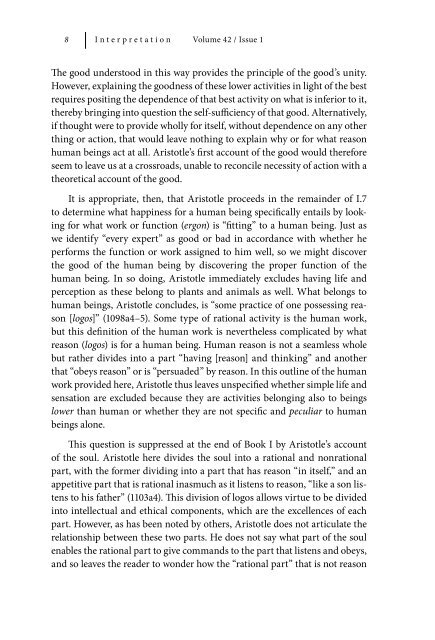Fall 2015
Vol_42_1
Vol_42_1
- No tags were found...
Create successful ePaper yourself
Turn your PDF publications into a flip-book with our unique Google optimized e-Paper software.
8 I n t e r p r e t a t i o n Volume 42 / Issue 1<br />
The good understood in this way provides the principle of the good’s unity.<br />
However, explaining the goodness of these lower activities in light of the best<br />
requires positing the dependence of that best activity on what is inferior to it,<br />
thereby bringing into question the self-sufficiency of that good. Alternatively,<br />
if thought were to provide wholly for itself, without dependence on any other<br />
thing or action, that would leave nothing to explain why or for what reason<br />
human beings act at all. Aristotle’s first account of the good would therefore<br />
seem to leave us at a crossroads, unable to reconcile necessity of action with a<br />
theoretical account of the good.<br />
It is appropriate, then, that Aristotle proceeds in the remainder of I.7<br />
to determine what happiness for a human being specifically entails by looking<br />
for what work or function (ergon) is “fitting” to a human being. Just as<br />
we identify “every expert” as good or bad in accordance with whether he<br />
performs the function or work assigned to him well, so we might discover<br />
the good of the human being by discovering the proper function of the<br />
human being. In so doing, Aristotle immediately excludes having life and<br />
perception as these belong to plants and animals as well. What belongs to<br />
human beings, Aristotle concludes, is “some practice of one possessing reason<br />
[logos]” (1098a4–5). Some type of rational activity is the human work,<br />
but this definition of the human work is nevertheless complicated by what<br />
reason (logos) is for a human being. Human reason is not a seamless whole<br />
but rather divides into a part “having [reason] and thinking” and another<br />
that “obeys reason” or is “persuaded” by reason. In this outline of the human<br />
work provided here, Aristotle thus leaves unspecified whether simple life and<br />
sensation are excluded because they are activities belonging also to beings<br />
lower than human or whether they are not specific and peculiar to human<br />
beings alone.<br />
This question is suppressed at the end of Book I by Aristotle’s account<br />
of the soul. Aristotle here divides the soul into a rational and nonrational<br />
part, with the former dividing into a part that has reason “in itself,” and an<br />
appetitive part that is rational inasmuch as it listens to reason, “like a son listens<br />
to his father” (1103a4). This division of logos allows virtue to be divided<br />
into intellectual and ethical components, which are the excellences of each<br />
part. However, as has been noted by others, Aristotle does not articulate the<br />
relationship between these two parts. He does not say what part of the soul<br />
enables the rational part to give commands to the part that listens and obeys,<br />
and so leaves the reader to wonder how the “rational part” that is not reason


